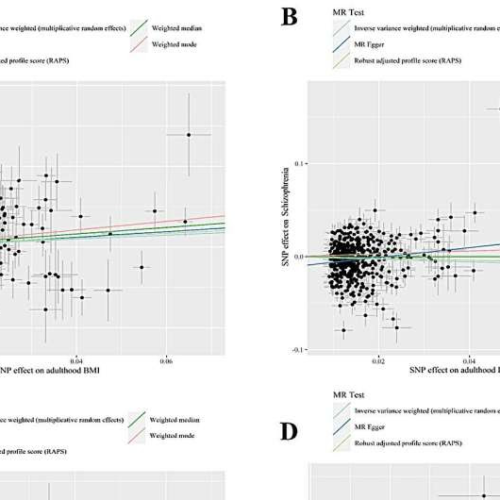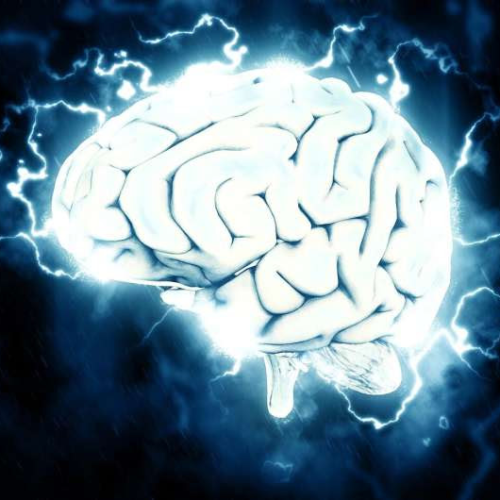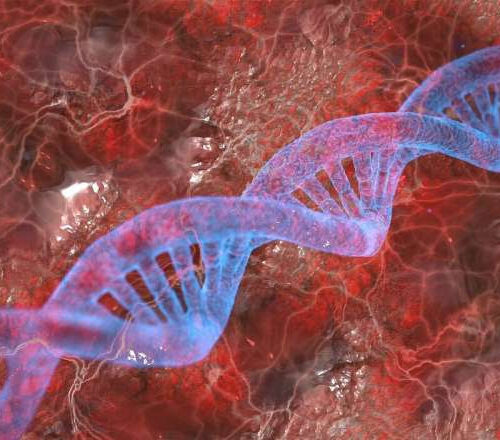September 17, 2024 by Bob Yirka , Medical Xpress Scatter plots of SNP potential effects on childhood and adulthood BMI versus significantly associated outcomes in the Psychiatric Genomics Consortium dataset. BMI, body mass index. A, adulthood BMI versus major depressive disorder; B, adulthood BMI versus schizophrenia; C, adulthood BMI versus obsessive-compulsive disorder; D, childhood BMI...
Tag: <span>Schizophrenia</span>
Severe side effects of the most effective schizophrenia medication identified
September 18, 2024 by University of Helsinki Credit: Pixabay/Gerd AltmannAbout one-third of patients with schizophrenia do not respond to conventional medications, leaving them with one effective treatment option: clozapine. Clozapine’s most serious side effect, a life-threatening drop in white blood cell levels, has been effectively controlled through strict monitoring. However, recent findings show that the...
Unraveling schizophrenia: New insights into genetic and environmental interplay
September 10, 2024 by Genomic Press Credit: Pixabay/CC0 Public DomainIn the complex landscape of mental health research, a new viewpoint offers a critical examination of how genes and environment conspire to influence schizophrenia risk. Published in Genomic Psychiatry, this analysis by researchers Natassia Robinson and Sarah E. Bergen from Karolinska Institutet in Stockholm, Sweden, brings...
Researchers discover a mechanism that impairs synaptic plasticity in the brains of schizophrenia patients
News Release 4-Sep-2024 Peer-Reviewed PublicationTampere University A new study led by researchers at Tampere University has mapped genes linked to schizophrenia and uncovered a mechanism that disrupts synaptic plasticity in affected individuals. The researchers showed the role of three proteins in mediating the impairments of plasticity in schizophrenia. The findings may hold promise for the...
Brain study reveals cause of apathy in schizophrenia
University of Geneva Jul 2 2024 Schizophrenia, which affects up to 1% of the population, is a neuropsychiatric disorder characterized by multiple symptoms. One of the most common, and for which there is no treatment, is apathy and lack of motivation. By comparing neural activation between a group of patients and a control group during...
Common Biological Basis Identified in Schizophrenia and Aging
Tightly synchronized genetic changes in two types of brain cells may underlie cognitive impairment in both conditions. Researchers from the Broad Institute of MIT and Harvard, Harvard Medical School, and McLean Hospital have uncovered a strikingly similar suite of changes in gene activity in brain tissue from people with schizophrenia and from older adults. These...
Can brain stimulation benefit individuals with schizophrenia?
Peer-Reviewed Publication WILEY Most people with schizophrenia have extensive impairment of memory, including prospective memory, which is the ability to remember to perform future activities. Results from a randomized clinical trial published in Neuropsychopharmacology Reports indicate that repetitive transcranial magnetic stimulation (rTMS), a non-invasive method that uses alternating magnetic fields to induce an electric current...
New treatment modality may reduce obesity in schizophrenia patients
by Elana Gotkine Credit: Pixabay/CC0 Public Domain In individuals with schizophrenia, accelerated continuous theta burst stimulation (cTBS) seems promising for treating obesity, according to a study published online Oct. 31 in Schizophrenia Bulletin. Dongyu Kang, M.D., from The Second Xiangya Hospital of Central South University in Changsha, China, and colleagues conducted a double-blind, randomized trial...
Unexpected link found between 2 schizophrenia risk proteins
by Emily Caldwell, The Ohio State University Behavioral alterations in MAP6−/− and Kv3.1−/− mice. Adult (3–6 months old) WT B6 (black bars), MAP6−/− (red bars), and Kv3.1−/− (green bars) mice were used in a series of behavioral assays. Each group contained approximately half male and half female mice. a Example traces in the elevated plus maze...
Study supports hypothesis that mitochondrial dysregulation is a contributor to the development of schizophrenia
by Rutgers University Credit: Pixabay/CC0 Public Domain Researchers at Rutgers and Emory University are gaining insights into how schizophrenia develops by studying the strongest-known genetic risk factor. When a small portion of chromosome 3 is missing—known as 3q29 deletion syndrome—it increases the risk for schizophrenia by about 40-fold. Researchers have now analyzed overlapping patterns of altered gene activity...





